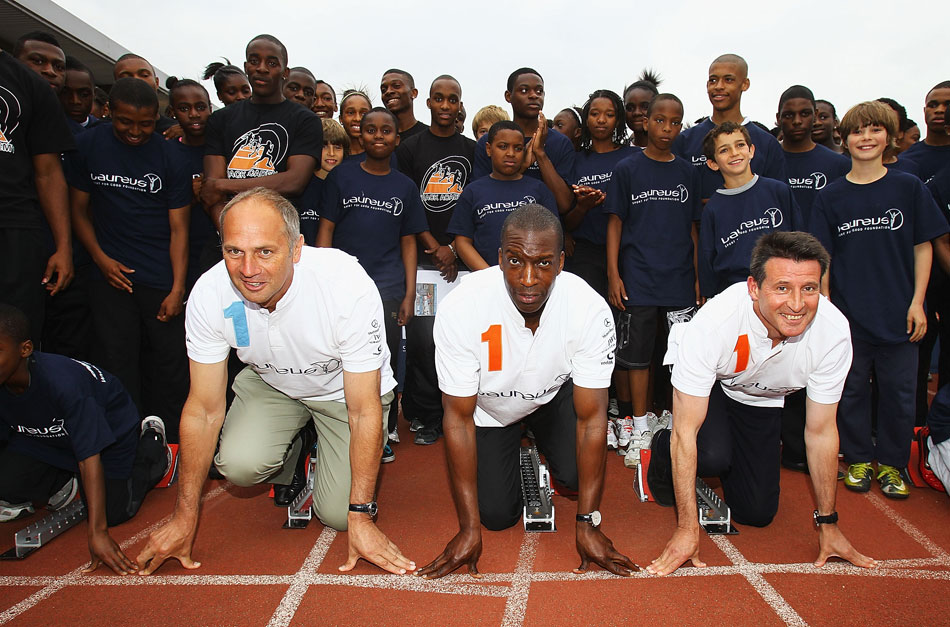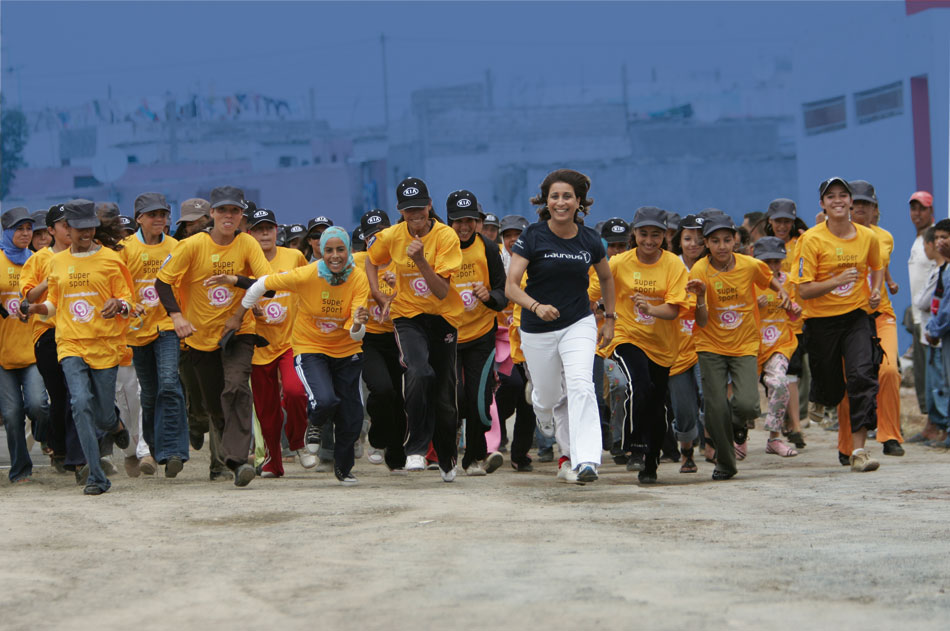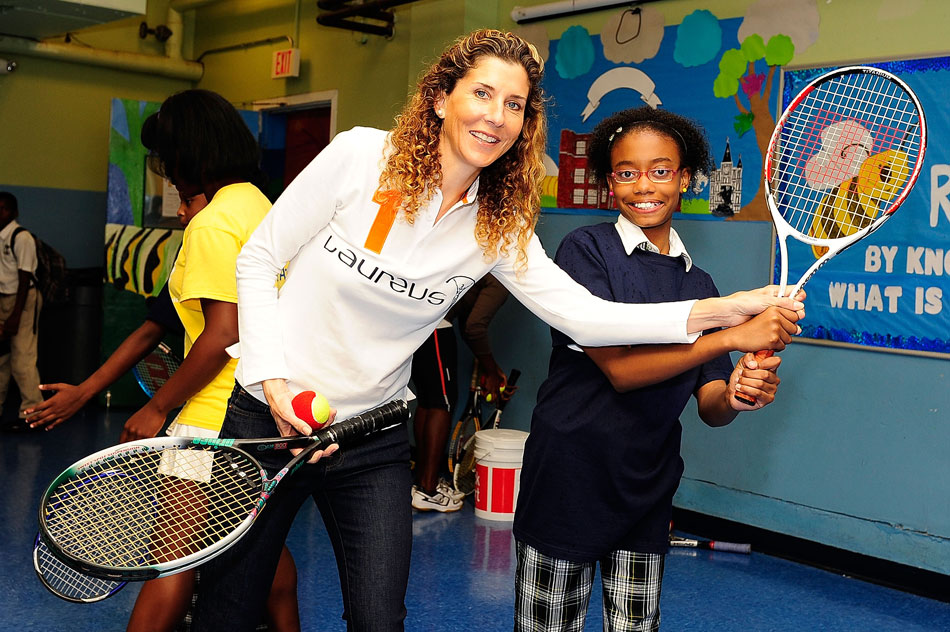A unique collaboration between luxury brands and the world’s greatest sporting legends has helped young people around the world overcome challenging social issues such as poverty, homelessness, war, violence, drug abuse, discrimination and AIDS.
As Michael Johnson settled into the starting blocks at the Atlanta Olympics in 1996 to set a new world record for the 200 meters, he could never have imagined jogging playfully alongside kids in Kenya a few years later, helping raise self-esteem among young people in one of Africa’s largest slums. When Nawal El Moutawakel crossed the finish line at the 1984 Los Angeles Games and became the first Moroccan, African and Muslim woman to win an Olympic gold medal, she had no idea that she’d one day be leading 30,000 Muslim girls on an annual 10 km fun run around Casablanca, and pioneering sport among women in Moroccan society.
Britain’s greatest ever Paralympic athlete, Tani Grey-Thompson, six-time winner of the London Wheelchair marathon, despite a debilitating back disease that’s confined her to a wheelchair, could never have guessed that she’d find herself in the West Bank in Gaza one day, inspiring Israeli and Palestinian kids to work together through a basketball match. Johnson, El Moutawakel and Grey-Thompson form part of a unique association of 46 of the world’s greatest living sporting legends, The Laureus Academy, that embraces the principle of using sport to help bring positive change to disempowered communities.
They offer their time to support the work of the Laureus Foundation, by visiting over 140 projects around the world, all utilizing sport to turn kids away from the negative influences in society, and helping them realize their true potential. Other sporting greats who have aligned themselves with the Laureus include, Boris Becker, Jack Nicklaus, Hugo Porta, Kapil Dev, Sebastian Coe, Monica Seles, Tony Hawk and Dan Marino.
This grassroots, life-changing work, is offset by a glittering sports awards ceremony, held each year in a different city, that sees the Academy members mingle with top sportspeople, presidents and royalty, to recognize sporting excellence. Commonly referred to as the “Oscars of sport,” the award ceremony was conceived as a way of bringing together the biggest names in sport and raising awareness around sport as a catalyst for change.
While big sporting celebrities walk away with solid gold and silver trophies produced by Cartier, after acceptance speeches for categories such as Breakthrough of The Year and Spirit of Sport Award, they are typically found a few months later in the slums of India or surveying the aftermath of a Tsunami in Indonesia, offering their expertise to rebuild communities. Significant global brands have come onboard as sponsors to ensure the work is maintained, and in return, their brand travels the world and associates itself with top sports personalities and events.
One of the global partners, luxury Swiss watch manufacturer IWC Schaffhausen, has even developed a special, limited edition watch for the benefit of the foundation, featuring the engraved artwork of a winner from one of the global Laureus projects. CEO of IWC Schaffhausen, Georges Kern, who has personally driven the Swiss watch manufacturer’s social responsibility program, says: “The privileged people on this planet – and we are among them – must do something to help those who are socially, physically or economically disadvantaged.
Through sport, Laureus gives people fresh hope and promotes social skills such as respect for opponents, recognition of rules, fair play and teamwork.” Other sponsors and patrons, such as Mercedes-Benz, Richemont, Daimler and the cities that play host to the yearly awards, benefit from huge global exposure by participating in A-list events and through their association with household names in sport.

From a logo on a T-shirt in Africa to major television coverage at a Formula One event, sponsors are perfectly positioned to do well by doing good. “Politicians love movie stars, and movie stars love sportspeople,” says Edwin Moses, Chairman of the Laureus World Sports Academy. “We’re at the top of the influence chain, and because our physical skills are not easily replicated, we command huge respect and can influence lives.”
Tennis legend Martina Navratilova, an active Academy member, has seen the benefits of this unique business model firsthand: “We have raised over $100 million since 2001 and now there are over 120 projects globally. Over 1.5 million kids have been helped in a positive way,” she says.
The Laureus story is a heady mix of corporate sponsorship, celebrity sport and the will to succeed in some of the most devastated and impoverished parts of the planet. Projects have saved kids from gangs in Sao Paulo, reformed child soldiers in Sierra Leone, given hope to special needs kids in Shanghai and helped clear mines in Cambodia. It embodies something every sportsperson who has ever achieved greatness can attest to – that winning comes through a combination of self discipline and teamwork – mirroring the same qualities needed to win in life. It was the lack of a formal platform to honor this greatness that sparked the idea for Laureus in the first place. The year 2000 dawned with a mixture of hope and expectation as the world prepared for the new Millennium.
The United Nations declared 2000 to be the International Year for the Culture of Peace, and global warming was something most people were hardly aware of. Indeed, Al Gore was a US Presidential candidate that year, and had yet to move on to become the maker of the award-winning ecological wake-up film An Inconvenient Truth. As ever, sport was full of promise. The Millennium Olympic Games were just around the corner in Sydney, and indeed proved to be one of the most successful ever. And something else significant was stirring: an idea which was to prove radical and innovative, and, once it became reality, a beacon of hope for disadvantaged young people.
The seed of the idea that grew to become Laureus was first planted several years before the Millennium by Johann Rupert, Executive Chairman of luxury goods company Richemont. A noted sports enthusiast, Rupert was at a dinner with friends one evening and mused over the fact that there was no Nobel Prize or Oscars-style awards for sport.
Rupert’s views on the power of sport were fundamentally influenced by the crucial role that the 1995 Rugby World Cup played in the reconciliation of the different communities in South Africa, and in 1998 he found a kindred spirit in Dieter Zetsche, Chairman of German automotive giant Daimler, like Richemont, another blue chip company with a long commitment to sport. Two years later, the Laureus World Sports Academy was created, with 30 of the greatest living sports legends named as founder members.
On May 25, 2000, the majority of the Academy members gathered in Monaco for the very first Laureus World Sports Awards. It was an impressive collection of sporting legends, but it is fair to say that the biggest name was a huge surprise all round, as the door to the Academy meeting room opened and in walked President Nelson Mandela. It was in Monaco that Mandela, who was to become the Patron of Laureus, made the visionary speech which has become the philosophy of Laureus and the driving force that has shaped its work for the last 13 years.
His speech has become the dictum not only for Laureus, but for the whole sport for good movement. He said: “Sport has the power to change the world. It has the power to inspire. It has the power to unite people in a way that little else does. It speaks to youth in a language they understand. Sport can create hope, where once there was only despair. It is more powerful than governments in breaking down racial barriers.
It laughs in the face of all types of discrimination.” With much conflict in the world based on ignorance or fear of other cultures, breaking down this discrimination could be seen as a crucial part of creating prosperity for future generations. Perhaps the power of sport can best be illustrated by an encounter Rupert once had with a friend of his.
“Some 30 years ago, while living in New York City, I had a black friend who was a true sports superstar,” says Rupert. “He was constantly mobbed for autographs. I noticed that he took extra care giving signed posters to white kids. I asked him about the apparent favoritism. His answer: “Johann, if a white kid has my poster in his bedroom, he can hardly discriminate against the black kid in his class.”





































